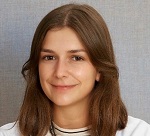Course report
Particle Therapy 2022 - PDF Version
29 May-2 June 2022, Aarhus, Denmark
Course directors:
- Marco Krengli, radiation oncologist, University of Piemonte Orientale & Centro Nazionale Adroterapia Oncologica (CNAO), Pavia, Italy
- Tony Lomax, medical physicist, Paul Scherrer Institute, Villigen, & ETH Zurich, Switzerland
A report from a radiation oncologist’s perspective
Could you please briefly introduce yourself?
My name is Marta García Marqueta. I completed my medical degree at the University of Oviedo (Asturias, Spain) and I have just finished my training period as a Radiation Oncology resident at the Catalan Institute of Oncology in L’Hospitalet de Llobregat (Barcelona, Spain).
Why did you choose to attend this course?
I thought that this course offered me a great chance to learn about particle therapy, as this discipline is not included in the training programme for radiation oncology residents in Spain. This technique was not available in any centre in Spain until it was introduced two years ago. Now several ongoing projects aim to start this treatment in the next five years.
What aspects of the course were the most interesting and why?
The course offered a golden opportunity to listen to people, both speakers and attendees, who had experience in this field. The discussions that followed the presentations were very enriching. I found it especially interesting that the speakers expressed their concerns and encouraged the attendees to keep enhancing the knowledge of this technique and experience of its use. Their comments highlighted the importance of providing high-quality evidence. It was also fantastic to have a chance to visit the facilities of the Proton Centre at the Aarhus University Hospital. The staff were very welcoming.
Did the course activities improve your knowledge and skills in the relevant subject?
Considering that I had little experience in the field, it was easy for me to acquire plenty of new concepts. More experienced attendees also told me that they found the content complete and relevant.
Did the course meet your expectations? If so, how?
The course far exceeded my expectations. The scientific programme was truly comprehensive. It ranged from the fundamentals (in terms of physical, radiobiological and clinical concepts), to talks on technological development and experiences in the use of the most innovative techniques (such as FLASH therapy and proton micro/mini beams in spatial fractionation).
List three important ‘takeaways’ following the course.
- Particle therapy is an additional tool in the field of radiation oncology and offers dosimetric and clinical advantages in certain situations.
- The technique involves many uncertainties. Further studies are necessary and continuous education is crucial.
- This type of event provides an integral overview of particle treatment, state-of-the-art clinical outcomes and future perspectives. It also enables a close exchange of ideas and experiences with colleagues from different countries.
How will what you have learned be implemented in your daily job/ clinical practice?
This knowledge will help me in my current daily practice as it will enable me to know the main indications for the use of particle therapy and in which situations it might offer a benefit. I will quite soon join a European proton therapy centre, so this knowledge will be a great starting point.
How would you encourage someone who has never been to an ESTRO course to join this course next year/ in two years?
I believe this course may be of interest to workers in the field of radiation oncology (physicists, physicians, residents, dosimetrists, technicians, nursing staff) regardless of whether or not they have experience in particle therapy. Since it provides both an overview of the technique and data on the latest advances, I highly recommend it.

Marta García Marqueta
Junior Radiation Oncologist
Catalan Oncology Institut (L’Hospitalet de Llobregat)
Barcelona, Spain
marquetamarta47@gmail.com